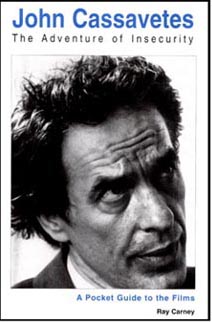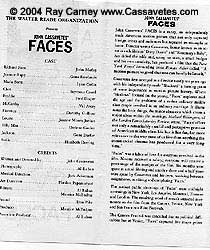|
This
page only contains excerpts and selected passages from Ray Carney's John
Cassavetes: The Adventure of Insecurity.
To learn how to obtain the book, please click
here.
To
read about Ray Carney's discovery of a long version of Faces, click
here. To read about the press response to the Faces discovery, click
here. To read about Gena Rowlands's response to Prof. Carney's Faces discovery, click
here.
Ray Carney's
John Cassavetes: The Adventure of Insecurity
Excerpts from
the discussion of Faces
Click
here for best printing of text
|
|
 Faces,
which is beyond all doubt or dispute one of the two or three supreme masterworks
in American film, came out of one of the most troubled times in Cassavetes’
life. In the early 1960s, after his first independent feature, Shadows,
got some favorable attention, the filmmaker was offered the opportunity
to make films in Hollywood. Naive as he was, he thought his dream had
come true. He moved from New York to Los Angeles believing he could do
the same thing he had done as an indy—only this time with a decent budget,
a professional crew, and a studio support system. Faces,
which is beyond all doubt or dispute one of the two or three supreme masterworks
in American film, came out of one of the most troubled times in Cassavetes’
life. In the early 1960s, after his first independent feature, Shadows,
got some favorable attention, the filmmaker was offered the opportunity
to make films in Hollywood. Naive as he was, he thought his dream had
come true. He moved from New York to Los Angeles believing he could do
the same thing he had done as an indy—only this time with a decent budget,
a professional crew, and a studio support system.
The result, needless to say, was not what
he had expected. The first project, Too Late Blues, was rocky going,
and the second, A Child Is Waiting, was an absolute disaster. Cassavetes
had a series of clashes with the producer, Stanley Kramer—one of the most
powerful men in Hollywood—which not only resulted in the movie being taken
away from him and re–edited, but in him being blackballed from working
again. Cassavetes was unemployed and unemployable. He went back to his
big, new house, and for the next couple years, in his own words, "looked
at trees ... and learned patience."
 The
young actor–director had never met these kinds of people before—high–octane
executives whose principal interest was money and power. Art was a dirty
word to these guys, and emotion just a way to suck dollars out of viewers’
pockets. Cassavetes was young, idealistic, and inexperienced, and had
such a different perspective on life that even after the dust had settled
he couldn’t really understand why they’d treated him the way they had. The
young actor–director had never met these kinds of people before—high–octane
executives whose principal interest was money and power. Art was a dirty
word to these guys, and emotion just a way to suck dollars out of viewers’
pockets. Cassavetes was young, idealistic, and inexperienced, and had
such a different perspective on life that even after the dust had settled
he couldn’t really understand why they’d treated him the way they had.
But where the person aches, the artist makes.
Rather than just forgetting the whole excruciating episode, Cassavetes
decided to make a movie about the people who had made him so miserable.
He told me he made Faces to try to figure out what made these guys
tick—how they could be so entertaining and so much fun to be with in some
ways, and so awful in others. He wanted to understand how they acted when
they were home eating supper with their wives. He wanted to understand
what their sex lives were like. He wanted to get inside their hearts and
heads.
That, in fact, is the essence of Cassavetes’
method. Each of his films is an effort of sympathetic understanding,
an act of empathy. The goal is not to stand outside and judge (in
the Altman
way), but to go inside and understand. Cassavetes’ supreme achievement
in all of his work is his ability to enter deeply and sympathetically
into his characters’ points of view, as strange or different from his
own as they might be—from figures as emotionally withdrawn and guarded
as Love Streams’ Robert Harmon and The Killing of a  Chinese
Bookie’s Cosmo, to ones as terrifyingly vulnerable and open as A
Woman Under the Influence’s Mabel. To do this is to inhabit "otherness"
in a sense far more profound than is dreamt of by the multiculturalists.
It is to get so deeply inside "otherness" that you ultimately
transform it into "us–ness." Chinese
Bookie’s Cosmo, to ones as terrifyingly vulnerable and open as A
Woman Under the Influence’s Mabel. To do this is to inhabit "otherness"
in a sense far more profound than is dreamt of by the multiculturalists.
It is to get so deeply inside "otherness" that you ultimately
transform it into "us–ness."
BREAKING NEWS!!! RAY
CARNEY DISCOVERS A NEW PRINT OF FACES THAT CONTAINS SCENES DELETED FROM
THE RELEASE PRINT. CLICK
HERE TO READ ABOUT IT.
This page only
contains excerpts and selected passages from Ray Carney's John Cassavetes:
The Adventure of Insecurity. To learn how to obtain the book, please
click
here.
|









